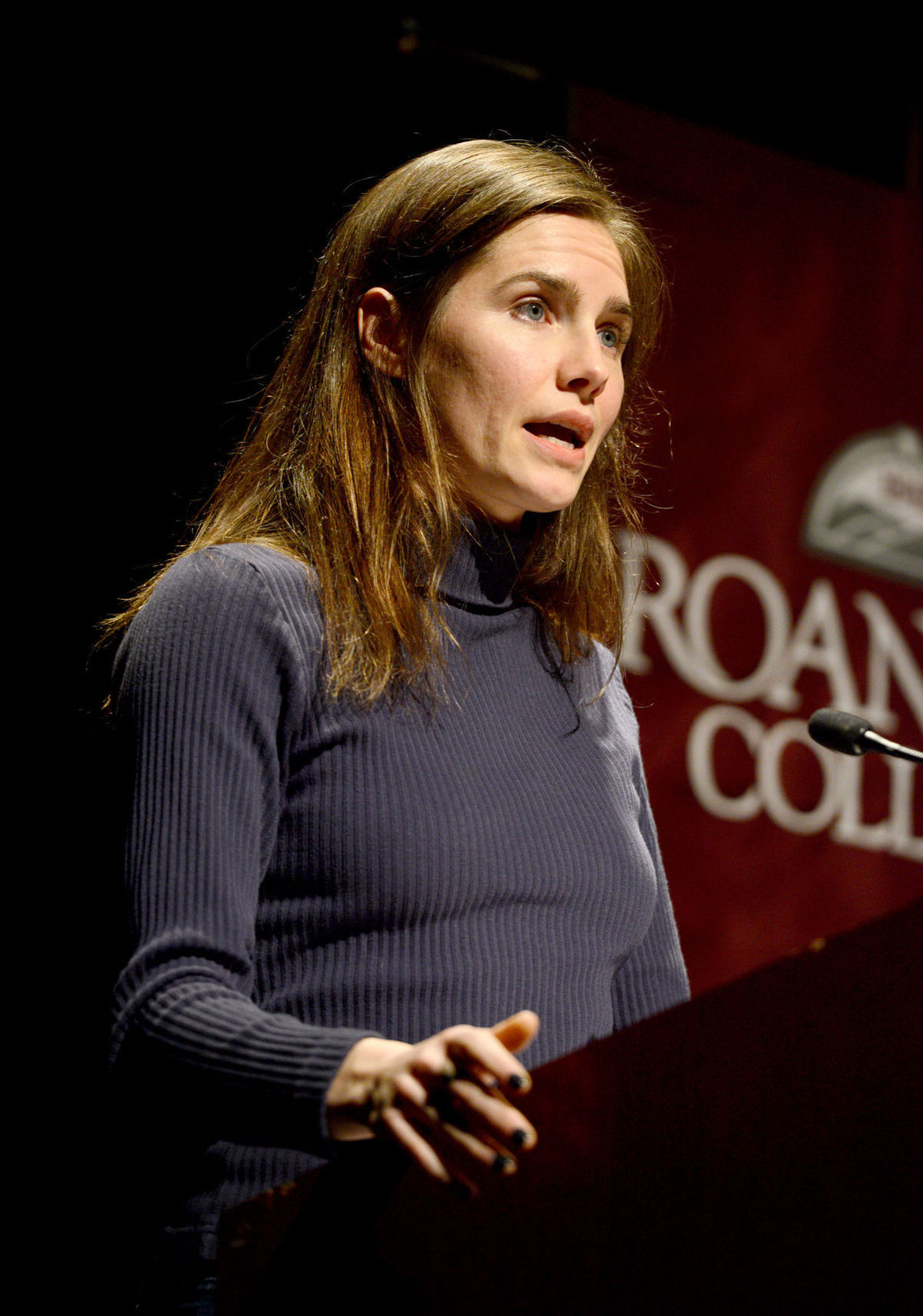Written by Bradley Bommarito
A harrowing story of murder, police misconduct, and false imprisonment that has captivated millions was shared with an auditorium of Roanoke College students, faculty, and community members last Wednesday night.
Olin Theater was filled to capacity for one of the spring semester’s most publicized events- “Truth Matters: A Conversation with Amanda Knox.” The event was so popular, in fact, hundreds of people were turned away from the venue by Campus Safety officers 20 minutes before the 7:30 p.m. start time. After introductory remarks, Knox took the stage and launched into her captivating story.
“I remember the small details of that moment. I remember how our footsteps echoed on the polished cement floor,” said Knox, who began her tale with a vivid description of her incarceration.
Knox was arrested on Nov. 6, 2007 in Perugia, Italy, for the murder of her flatmate Meredith Kercher and a few related charges. She alleges that she endured physical and psychological abuse by police interrogators in the days leading to her arrest. Without access to a translator or lawyer for most of the interrogation period, Knox was bullied into changing her story several times, thereby incriminating herself.
“The controversy was so tantalizing. The story was so good. The truth didn’t matter,” said Knox.
The case became a media circus that was seen as a miscarriage of justice. Prosecutors focused obsessively on Knox’s sex life and accused her of being a drug-using “she-devil.”
“My sexual history was spun into a deviancy by the prosecutors and the media,” said Knox. “I was depicted as such a whore, so jealous of Meredith’s body that I raped and killed her for it.”
Prosecutors won the case based on questionable DNA and circumstantial evidence. On Dec. 5, 2009, Knox and her boyfriend Raffaele Sollecito were convicted of murder and sentenced to 26 years and 25 years in prison, respectively.
“The guilty verdict felt as if suddenly I had been submerged, because I could only hear the sounds of my family weeping and ringing in my ears,” said Knox.
After years of fighting a foreign criminal justice system that was already biased against her, the conviction left Knox feeling crushed and empty.
“It wasn’t just a bitter pill to swallow,” said Knox. “It was an existential crisis. I had to accept that the new emotional default setting of my life was sadness.”
About eight months of Knox’s sentence was served in solitary confinement. Knox was confined to her cell for 22 hours per day, released only for bathing and meals.
“I was tired, I was scared, and I couldn’t deal with this uncertainty anymore,” said Knox.
She received a maximum monthly visitation allotment of 6 hours per month. Her family stayed in Italy for various periods of time, ensuring that there was always someone for Knox to visit with. Shortly after the trial, Knox was informed by her father that it could take years for an appeal.
“He cried and he held me, and I knew I was in deep trouble because I had never seen my dad cry before,” said Knox.
Knox was eventually mainstreamed with other prisoners. She spent her time writing letters to family and friends, reading books, and helping other prisoners attain literacy.
“Prison is a dead environment where you become devalued. I started reading all the existential literature, especially Camus,” said Knox.
After an appellate trial that began in Nov. 2010, Knox and Sollecito were found not guilty of the murder the following October. Knox’s family promptly took her back to their home in Seattle, Wa.
“I’m thrilled to be back in the world, free to live my life,” said Knox.
Her legal troubles, however, did not end with the 2011 acquittal. While Knox struggled to put her life back together, Italy’s Supreme Court set aside the appeal and tried the case once again. Ultimately, she and Sollecito were permanently acquitted on March 25, 2015 due to serious procedural mistakes and investigative misconduct.
“For most people, I didn’t exist before the crime happened and I didn’t exist after I was acquitted. I pay my bills and take out the trash like everyone else,” said Knox.
Knox is now a freelance journalist, author, and host of an upcoming television series about those who have been wrongfully convicted. She is also a political activist that works with the Innocence Project and similar nonprofit organizations.
“If I’ve learned anything, you can’t uncover the truth by masking reality. The truth is complicated and messy sometimes,” said Knox.
Now 30 years old, she lives in a one-bedroom apartment in Seattle with her boyfriend and three cats.
“You have one life, and you’d be surprised by how much pain you can suffer as long as you find meaning in it,” said Knox.
Knox concluded her talk by thanking the audience and all those who supported her through difficult times.
“I had a lot of help from my family, friends, and people like you that wanted to see me in person. My final word- thank you,” said Knox.




